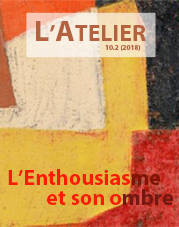Le romantisme (anglais) est un enthousiasme
Keywords:
Enthousiasme, Blake, Wordsworth, Coleridge, Keats, Shelley, RomantismeAbstract
Présentée sous la forme d'un énoncé sartrien, la proposition selon laquelle le romantisme anglais est un enthousiasme n'entend pas faire l'économie d'un rappel historique : celui de la querelle qui opposa, pendant toute la durée de la période, et même bien en amont, partisans et adversaires de l'enthousiasme. Le contentieux, de nature linguistique, théologique, mais également politique, conduisit les poètes romantiques à revendiquer le retour à un état, ainsi qu'à des modalités, anciens de l'enthousiasme, tel que pratiqué par les Grecs—à rebours des amalgames apparus tout au long des dix-septième et dix-huitième siècles anglais, tendant à associer enthousiasme et superstition religieuse, enthousiasme et soulèvement populaire, enthousiasme et aliénation mentale. A la faveur de l'examen de quatre notions (étymologie, interpellation, circonstance et transport), c'est à une relégitimation symbolique, sur la base d'une repoétisation de l'enthousiasme que devrait donner lieu cet article, nourri des ouvrages récents de Jon Mee sur l'enthousiasme, ainsi que de ceux de Michel Deguy et Jacques Derrida, entre autres, pour ce qui est de la théorie. Sans écarter la thèse, notamment portée par Clément Rosset, selon laquelle la « grandiloquence » de type enthousiaste court souvent le risque de forclore le réel, l'article se conclut sur les accents triomphants de Blake, pour qui enthousiasme n'est pas arrogance.
Cast in the guise of a Sartrean phrase, the proposition which would have it that English Romanticism is an enthusiasm cannot afford to ignore the fierce antagonism which opposed declared partisans and enemies of enthusiasm throughout the period. The debate was to prove so fractious, from a linguistic, theological, as well as political point of view, that it led the Romantic poets to implement a return to such modalities of enthusiasm as practiced by the Greeks--in contradistinction to the amalgamations appeared in the course of the seventeenth, and eighteenth, centuries, which tended to associate enthusiasm and religious superstition, enthusiasm and popular uprisings, enthusiasm and mental alienation. Read in the light of four notions (etymology, interpellation, circumstance and transport), and benefiting from the invaluable contextual documentation provided by Jon Mee's recent studies on the subject as well as from the theoretical insights of Michel Deguy and Jacques Derrida, enthusiasm should thus come into its own, essentially by virtue of its being restored to its intrinsically poetic connotations. Despite ending with the triumphant accents of William Blake, the paper will not fail to address Clément Rosset's pointed reservations towards overgrandiloquent verbal expressions of enthusiasm, susceptible of forclosing the real.
Published
Issue
Section
License
- Work submitted for publication must be original, previously unpublished, and not under consideration for publication elsewhere. If previously published figures, tables, or parts of text are to be included, the copyright-holder's permission must have been obtained prior to submission.
- Authors of accepted manuscripts will assign to L'Atelier the right to electronically distribute their article, or publish it in any form (Internet, CD ROM, printed copy) but authors will retain copyright and, after the article has appeared in L'Atelier, authors may republish their text (in print and/or electronic form) as long as they clearly acknowledge L'Atelier as the original publisher.


